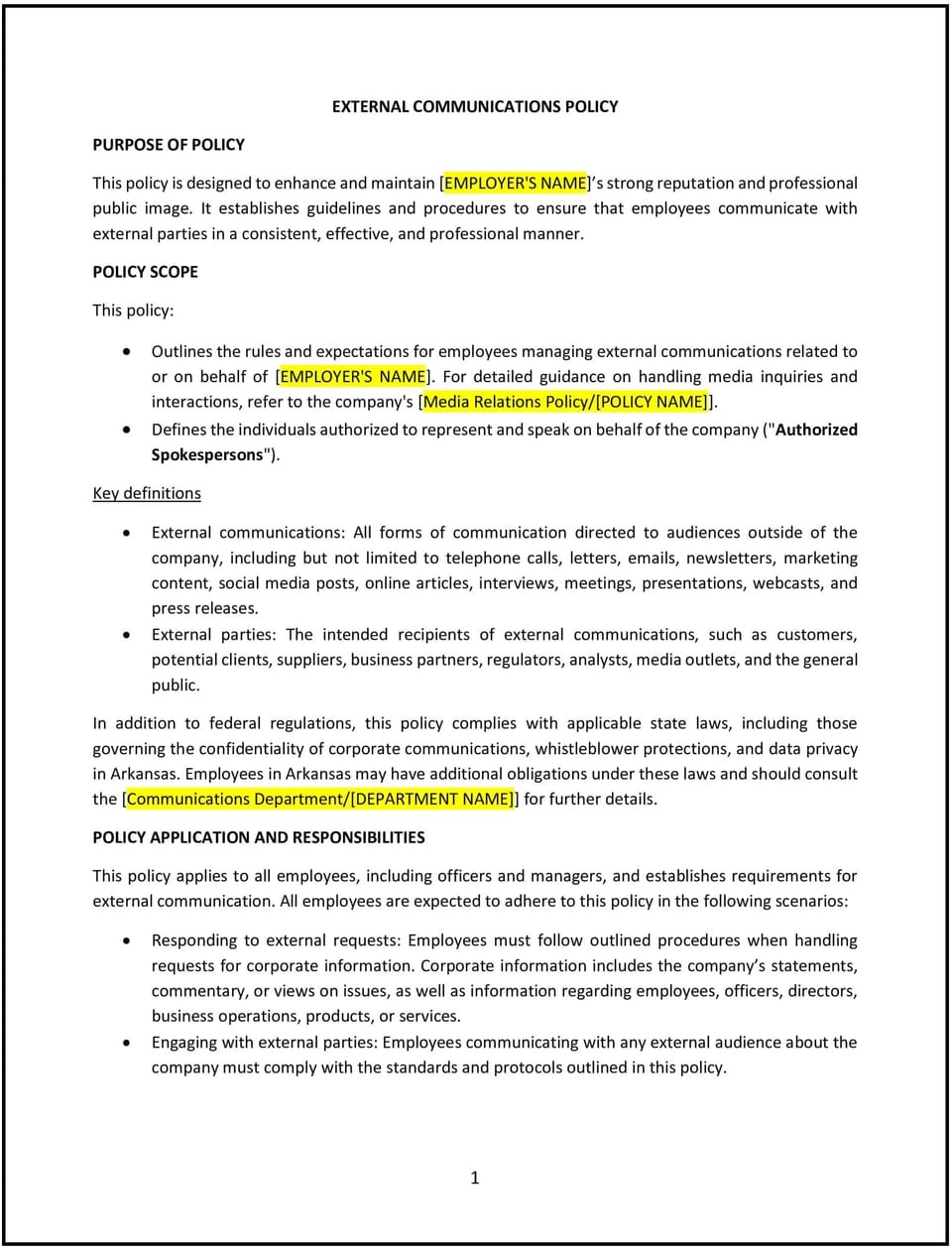External communications policy (Arkansas): Free template

External communications policy (Arkansas)
In Arkansas, an external communications policy provides businesses with guidelines for managing how employees interact with external stakeholders, such as clients, media, vendors, and the public. This policy ensures that all communications align with the business’s values, protect its reputation, and comply with state and federal laws.
This policy outlines the appropriate channels for external communication, approval procedures, and expectations for maintaining professionalism. By implementing this policy, Arkansas businesses can safeguard their public image, ensure consistent messaging, and support compliance with applicable regulations.
How to use this external communications policy (Arkansas)
- Define communication channels: Specify which platforms and methods are acceptable for external communications, such as email, phone, or social media.
- Assign spokespersons: Identify authorized individuals responsible for speaking on behalf of the business, particularly for media or public relations.
- Establish approval processes: Outline the procedures for reviewing and approving official communications, press releases, or public statements.
- Maintain confidentiality: Emphasize the importance of protecting sensitive business information when communicating externally.
- Provide training: Educate employees on the policy’s guidelines, including how to handle inquiries professionally and escalate issues when necessary.
Benefits of using this external communications policy (Arkansas)
This policy offers several advantages for Arkansas businesses:
- Protects the business’s reputation: Ensures consistent and professional communication with external stakeholders, minimizing risks of misinformation or negative publicity.
- Supports compliance: Aligns with Arkansas laws and federal regulations, ensuring legal and ethical external communication practices.
- Promotes accountability: Clarifies roles and responsibilities, ensuring employees understand their limitations and obligations when communicating externally.
- Enhances brand consistency: Maintains a unified and coherent message across all external interactions, reinforcing the business’s identity.
- Reduces risks: Minimizes the likelihood of unauthorized disclosures or statements that could harm the business or violate legal obligations.
Tips for using this external communications policy (Arkansas)
- Address Arkansas-specific considerations: Include state-specific laws or cultural sensitivities that may impact external communication practices.
- Regularly update contact lists: Ensure that spokespersons and media contact information are current and easily accessible to authorized employees.
- Monitor compliance: Periodically review external communications to ensure adherence to the policy and address any issues promptly.
- Foster collaboration: Encourage departments, such as marketing and legal, to work together to craft consistent and compliant messaging.
- Provide examples: Include sample communications or templates to guide employees in crafting professional and appropriate responses.
Q: How does this policy benefit the business?
A: This policy protects the business’s reputation, ensures consistent messaging, and reduces risks associated with unauthorized or inappropriate external communication.
Q: Who is authorized to speak on behalf of the business?
A: Only designated spokespersons, as outlined in the policy, are authorized to represent the business in external communications, such as media interviews or public statements.
Q: How does this policy support compliance with Arkansas laws?
A: The policy ensures external communications adhere to state and federal regulations, such as confidentiality requirements and advertising standards, reducing legal risks.
Q: What should employees do if they receive a media inquiry?
A: Employees should refer media inquiries to the designated spokesperson or communications team, as specified in the policy, to ensure accurate and authorized responses.
Q: How can the business ensure consistent messaging across all external communications?
A: The business can provide training, use approved templates, and establish a review process for all external communications to maintain consistency and professionalism.
This article contains general legal information and does not contain legal advice. Cobrief is not a law firm or a substitute for an attorney or law firm. The law is complex and changes often. For legal advice, please ask a lawyer.


